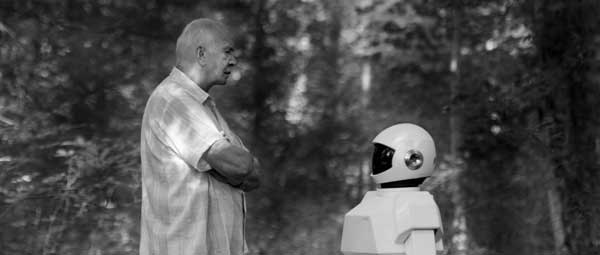
BY STEVE ERICKSON | If the predictions made about our future in “Robot & Frank” are accurate, relationships between parents and children will deteriorate, but we can look forward to a new world of human/ robot bonding. The closing credit sequence of “Robot & Frank” consists of footage of real-life robots, suggesting their future is just around the corner.
Jake Schreier’s feature is the kind of relatively low-budget, unpretentious sci-fi film Hollywood no longer knows how to make. I won’t make any great claims for it, but “Robot & Frank” is a lot more enjoyable than Ridley Scott’s bloated “Prometheus,” which found room for dense theological subtext but couldn’t tell a coherent surface narrative.
Christopher Ford’s script is relatively light on the specifics of our robot future. Skype has completely superseded ordinary phone calls. Books are in danger of being replaced by “augmented reality.” Most importantly, robot servants have become ubiquitous. Yet there are some large holes in the film’s vision of the future –– it doesn’t really imagine how television and the Internet might evolve, for example. “Robot & Frank” is content to let the spectator fill in those gaps.
At the beginning of “Robot & Frank,” 70-year-old Frank (Frank Langella) is suffering from dementia. He lives in a suburban New York community, where he enjoys walking to the library and flirting with librarian Jennifer (Susan Sarandon). But he keeps talking about going to a restaurant that’s long since gone out of business. His son Hunter (James Marsden) buys him a robot butler (voiced by Peter Sarsgaard), who is referred to simply as Robot. However, his daughter Madison (Liv Tyler), who’s traveling in Turkmenistan, is opposed to the use of machine labor.
At first, Robot and Frank don’t get along, though in time Robot adjusts to Frank’s routine –– which includes regular trips to a library being modernized by Jake (Jeremy Strong), an obnoxious yuppie, as well as luxury soap shoplifting sprees. As he grows to like Robot, Frank trains him to pick locks, preparing to burglarize Jake’s house.
Beneath the sci-fi trappings, “Robot & Frank” is a buddy comedy. Like many of them, it brings together two men –– Robot is technically genderless, but is voiced by a male actor –– from disparate backgrounds. Buddy films often pair white and African-American men; in this case, Robot adds the element of Otherness. Like many buddies, they spar at first. Frank feels patronized by Robot’s concern for his health and zeal to organize his life. Only with time does he come to respect Robot’s intelligence and ability to think on its feet. For its part, Robot begins to treat Frank as someone more than a man built on self-destruction.
Through Schreier’s eyes, the future does not look bright. The cinematography of “Robot & Frank” is bleached-out –– the colors are muted, with dark blues dominating, and the lighting is dim. Perhaps Frank feels more comfortable without the lights on. As far as I can tell, the film wasn’t shot on video, but it looks like HD.
Langella avoids playing his character’s dementia as a cute quirk. His relationship with Hunter and Madison is understandably distant, given that he was in prison for much of their childhood. It’s easy to appreciate how Hunter would grow sick of a ten-hour round-trip drive to visit a man who can’t remember that he graduated from college 15 years ago.
The film’s edge comes from the notion of burglary as therapeutic. It’s obviously the only thing Frank ever felt passionate about. Robot initially refers to picking locks as a hobby, and for Frank, it really is one. Monetary gain, at least at this point in his life, is secondary to the thrill of the burglary itself.
“Robot & Frank” treats technology as a fact of life, with a potential to be used for positive or negative purposes. Schreier and Ford obviously love libraries, and anyone who finds the prospect of the Kindle replacing paper books horrifying will find kindred spirits behind the story. Jake is presented as a figure to make fun of, and Madison doesn’t come off much better. She’s oblivious to the fact that she’s exploiting the people in Turkmenistan whose photogenic poverty she shows off. Her brand of NGO-driven humanism is, in important respects, the flipside of Jake’s drive to destroy the library. By training Robot to suit his needs, Frank seems to find a workable middle ground between the two.
If it weren’t science fiction, “Robot & Frank” might seem awfully familiar –– a tale about an aging crook out to do one last big job. Dozens of films have been made around the world with the same premise. Here, Ford manages to put some inventive twists on his narrative, and the cast members –– not least of them Sarsgaard, whose voice is convincingly mechanical –– give it their all. “Robot & Frank” is a real charmer.
ROBOT & FRANK
Directed by Jake Schreier
Rated PG-13
130 minutes
At The Angelika
18 W. Houston St. (at Mercer St.)
For info, visit angelikafilmcenter.com































